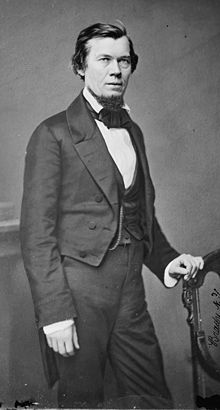Jacob Thompson
| Jacob Thompson | |
|---|---|
 |
|
| 5th United States Secretary of the Interior | |
|
In office March 10, 1857 – January 8, 1861 |
|
| President | James Buchanan |
| Preceded by | Robert McClelland |
| Succeeded by | Caleb B. Smith |
| Member of the U.S. House of Representatives for Mississippi's 1st district | |
|
In office March 4, 1847 – March 3, 1851 |
|
| Preceded by | District created |
| Succeeded by | Benjamin D. Nabers |
| Member of the U.S. House of Representatives for Mississippi's at-large district | |
|
In office March 4, 1839 – March 3, 1847 |
|
| Preceded by |
Thomas J. Word Seargent S. Prentiss |
| Succeeded by | no at-large seats |
| Personal details | |
| Born |
May 15, 1810 Leasburg, North Carolina, US |
| Died | March 24, 1885 (aged 74) Memphis, Tennessee, US |
| Political party | Democratic |
| Spouse(s) | Catherine Ann Jones Thompson |
| Alma mater | University of North Carolina at Chapel Hill |
| Profession | Politician, lawyer, teacher |
Jacob Thompson (May 15, 1810 – March 24, 1885) was the United States Secretary of the Interior, who resigned on the outbreak of the American Civil War, to become Inspector General of the Confederate States Army.
In 1864, Jefferson Davis asked Thompson to lead a delegation to Canada, where he appears to have been leader of the Confederate Secret Service. From here, he is known to have organised many anti-Union plots and was suspected of many more, including a possible meeting with Lincoln’s assassin, John Wilkes Booth.
Union troops burned down his mansion in Oxford, Mississippi, the hometown of William Faulkner, who based some of his fictional characters on Thompson.
Born in Leasburg, North Carolina in 1810, Thompson attended Bingham Academy in Orange County, North Carolina and later went on to graduate from the University of North Carolina in 1831, where he was a member of the Philanthropic Society. Afterwards, he served on the university faculty for a short time until he left to study law in 1832. He was admitted to the bar in 1834 and commenced practice in .
Thompson got involved in politics and was elected to the 26th Congress, serving from 1839 to 1851. He was appointed to the United States Senate in 1845 but never received the commission, and the seat went to Joseph W. Chalmers. Thompson was the chairman of the Committee on Indian Affairs in the 29th Congress. He lost reelection to the 32nd Congress and went back to practicing law until 1857, when newly elected President James Buchanan appointed Thompson United States Secretary of the Interior.
...
Wikipedia
